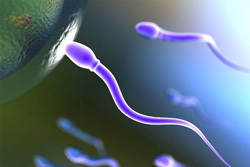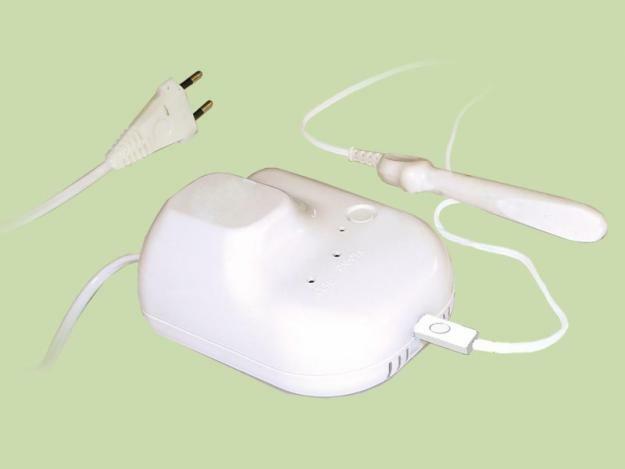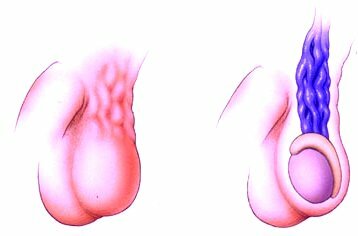Symptoms and Diagnosis of Urologic Diseases
Urological diseases in men include diseases of the urinary system( kidneys, ureters, bladder, urethra).Often, these diseases are described together with diseases of male genital organs( prostate, testicles, etc.), since these organs are inextricably linked, being the genitourinary system of the body.
content
- 1 Classification
- 2 Andrologic pathology: clinical presentation, diagnosis, and treatment approaches
- 2.1 Hyperplasia Prostate
- 2.2 Prostatitis
- 2.3 erectile dysfunction and male infertility
- 3 Inflammatory kidney disease, and urinary tract
- 3.1 Pyelonephritis
- 3.2 Inflammatory pathology urinaryPathways
- 4 Kidney and urinary tract diseases not associated with infection
- 4.1 Urolithiasis
- 4.2 KidneyI deficiency
- 5 Tumors of the urinary and male genital area
Classification of
In connection with the development of classical medicine, urology, which previously contained everything related to the genitourinary sphere, has long been divided into separate directions. Isolate proper urology, nephrology and completely separate there is venereology( the science of sexually transmitted diseases).In this article, for convenience, a series of the most common pathologies in men will be briefly considered, which may to some extent relate to all these directions.
The most common urological diseases in men:
- Andrological pathologies:
- prostatic hyperplasia;
- impotence, erectile dysfunction;
- male infertility;
- prostatitis( inflammation of the prostate gland);
- Inflammatory diseases of the kidneys and urinary tract:
- pyelonephritis;
- glomerulonephritis;
- cystitis, urethritis, balanoposthitis( including those transmitted by the venereal route);
- Urolithiasis( kidney stones, ureters, bladder stones).
- Renal failure( acute and chronic) - as a manifestation of a decrease in the excretory function of the kidneys due to various renal pathologies.
- Oncological diseases of the kidneys and urinary tract( the direction is called oncourology).
Andrological pathology: clinical manifestations, diagnosis and approaches to treatment
Prostatic hyperplasia
Prostate adenoma( hyperplasia) is a benign prostrate gland proliferation. It is important to note that the disease is never associated with cancer, the cause of which is a decrease in the production of the male sex hormone - testosterone, necessary for the normal functioning of the prostate. That is why the disease affects, in the main, patients who have crossed the threshold of men's menopause. It is believed that 50% of men over the age of 60 suffer from this disaster.
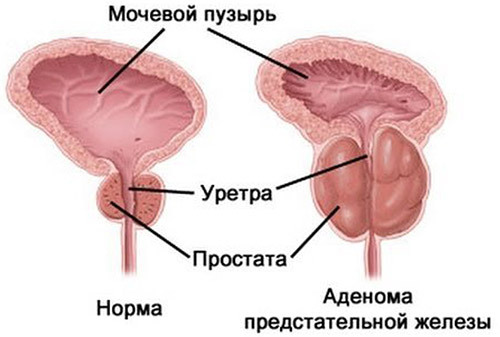
Increase( hyperplasia) of the prostate.
Prostate adenoma changes by urination. Due to irritation of the bladder enlarged in the size of the prostate, frequent urge to urinate. This may partially overlap the urethra. This is accompanied by difficulty urinating, a feeling of inferior emptying of the bladder, delayed urination( the patient can not extract urine with strong urge).The urine stream is interrupted, comes out fractional, splashed.
Approaches to treatment depend on the severity of dysuric disorders and the severity of disease progression. In the latent course of the patients, the patients are observed dynamically, with increasing symptoms prescribed drugs blocking the alpha adrenoreceptors of the bladder and prostate( prazosin, tamsulosin).They reduce the tone of the prostate gland and remove tension from the neck of the bladder, which leads to the restoration of the urinary flow and alleviation of symptoms.
If there is a marked violation of the outflow of urine with the danger of infection, renal failure against the background of blockage, as well as with ineffective drug therapy, prostatectomy( surgical removal of part of the prostate gland) is used.
Prostatitis
Or inflammation of the prostate. Can occur acutely or chronically, is caused by various pathogenic bacteria, manifests itself by pain, or weight in the lower abdomen, by malfunction of urination and by common symptoms of inflammation( fever, general weakness).In the diagnosis of the disease, in addition to digital rectal examination, the analysis of the secretion of the prostate becomes important, including the identification of the pathogen.
In the treatment of antibiotics, anti-inflammatory drugs, drugs that reduce stagnation, physiotherapy. A good effect in complex therapy is provided by finger massage of the prostate through the rectum.
Erectile dysfunction and male infertility
The andrological group of urological pathologies include erectile dysfunction( impotence) and male infertility. Both these diseases are secondary, develop as a consequence of a lesion of the prostate or testicles, are treated in a complex manner with an emphasis on the underlying disease.
Read more: Causes of erectile dysfunction in men
Inflammatory diseases of the kidneys and urinary tract
Pyelonephritis
Inflammation of the renal tissue( parenchyma) and the pelvic system caused by infection is called pyelonephritis.
In case of acute leakage, the disease manifests itself in low back pain, fever, general weakness, nausea, sweating. Characterized by the emergence of sharp intense pain with a slight effleurage of the lumbar region( a symptom of Pasternatsky).With chronic pyelonephritis, the symptoms are worn out. Dull pains in the lower back are noted against a background of subfibril temperature and general weakness.
In the diagnosis, the importance of laboratory methods of research. In the analysis of urine, leukocytes and erythrocytes are noted. Bacterial sowing reveals the pathogen, which allows you to assign the profile treatment.
Antibiotic therapy( antibiotics, nitrofurans) inhibit pathogens. In complex treatment, anti-inflammatory drugs, physiotherapy procedures, herbal decoctions( cowberry, juniper, bearberry, horsetail) are used.
Inflammatory pathologies of the urinary tract
Activity of pathogenic bacterial agents( microbes) can cause inflammation in the urethra( urethritis), bladder( cystitis), in the tissues of the glans penis( balanoposthitis).It is manifested by cuts and pains with urination, hyperemia of the glans penis. In the diagnosis of these diseases, first of all, pay attention to the identification of the pathogen by the laboratory method with the further administration of appropriate antibiotic therapy.
Kidney and urinary tract diseases not associated with infection
Urolithiasis
This is an exchange disease that results in the formation of stones( calculi) in the kidneys, ureters, bladder and urethra. One of the most terrible manifestations of this disease is renal colic - severe intense pain in the lumbar region, giving in the groin and along the ureter. To remove colic, powerful analgesics( baralgin) are used, sometimes drugs( promedol).
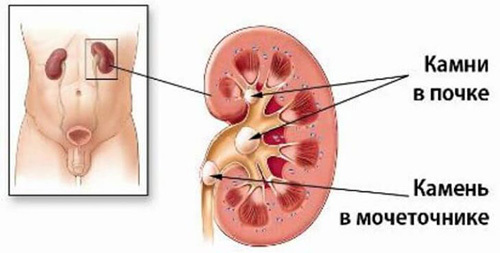
Urolithiasis - kidney stones.
Sometimes urolithiasis proceeds almost asymptomatically, with unexpressed pain. Then ultrasound and contrast urography are used for diagnosis. After revealing the stones, they are subjected to ultrasonic crushing or surgical removal. In the future, the patient is necessarily observed in the dynamics, because the stones can appear again.
Renal failure
Renal failure is a decrease in the functional activity of the kidneys, in which urine formation and blood purification are impaired. It is fraught with a violation of the exchange of nitrogen, electrolytes and the development of acid-base imbalance. Renal failure is not an isolated disease, but a consequence of pathologies that can develop both in the kidney itself( pyelonephritis, glomerulonephritis) and outside it( poisoning, severe infections, urine outflow disorders with stones and strictures, etc.).
In the diagnosis - renal failure, regardless of the underlying cause, the main value is acquired by the biochemical blood test. It shows an increase in creatinine, urea and residual nitrogen. The electrolyte composition of the blood changes( potassium and phosphorus rise, calcium decreases).
For effective treatment of renal failure, it is first of all necessary to properly combat the underlying disease( eliminate intoxication, remove inflammation in the kidney, restore urine flow).If kidney failure is started, you need to compensate for kidney function with hemodialysis( artificial kidney).In extreme cases, a donor kidney transplant is performed.
Read in depth: How to maintain kidney health to a man
Tumors of the urinary and male genital area
Neoplasms of the genitourinary sphere belong to the field of oncourology. The most common are kidney cancer, prostate cancer, testicular semenoma and bladder cancer. Less common are malignant tumors of the penis, urethra, etc.
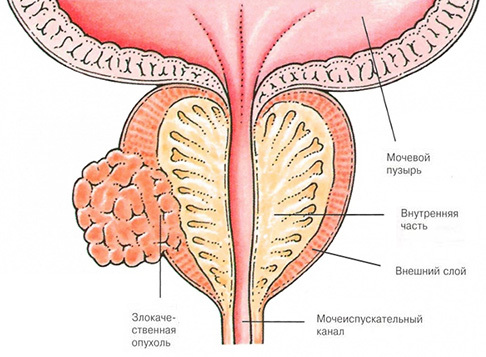
Prostate cancer.
All of them are manifested as a pain syndrome typical for oncology, localized depending on the place of the tumor and its metastasis. There is also cancer intoxication and organ failure. When diagnosing a tumor, it is necessary to pay attention to identifying both the tumor itself and the definition of metastases, for which it is necessary to carefully examine regional lymphatic vessels and distant organs and systems of the body( ultrasound, radiography, computed tomography).
Wide polymorphism of symptoms and the danger of developing severe complications require the attentive attitude of a man to any complaints from the genitourinary sphere. Early treatment to a doctor will, in many cases, maintain health and avoid serious complications.
See also: What is the treatment of a urologist andrologist?
Recommended for viewing:

